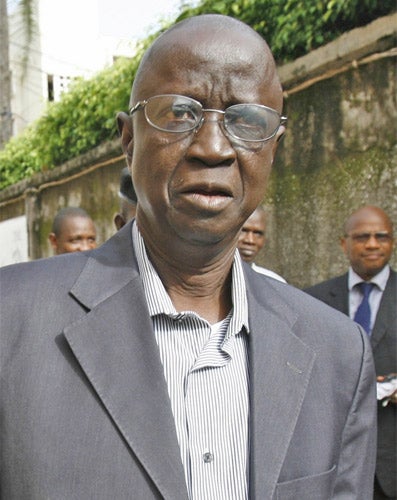Sudden death of election chief puts Guinea's historic vote in doubt

Your support helps us to tell the story
From reproductive rights to climate change to Big Tech, The Independent is on the ground when the story is developing. Whether it's investigating the financials of Elon Musk's pro-Trump PAC or producing our latest documentary, 'The A Word', which shines a light on the American women fighting for reproductive rights, we know how important it is to parse out the facts from the messaging.
At such a critical moment in US history, we need reporters on the ground. Your donation allows us to keep sending journalists to speak to both sides of the story.
The Independent is trusted by Americans across the entire political spectrum. And unlike many other quality news outlets, we choose not to lock Americans out of our reporting and analysis with paywalls. We believe quality journalism should be available to everyone, paid for by those who can afford it.
Your support makes all the difference.A landmark election that was meant to signal a new democratic trend in West Africa was in serious doubt last night as Guinea was gripped by a fresh political crisis.
The man meant to be overseeing the vote in a country struggling to emerge from decades of dictatorship and military rule has died in a Paris hospital, family friends confirmed yesterday.
Election chief Ben Sekou Sylla was accused of rigging the first round of voting on 27 June and convicted in his absence after returning to France for medical treatment. It was hoped that the poll would see an elected government take over from the military junta that has run the former French colony since the death of the dictator Lansana Conte two years ago.
With preparations for Sunday's presidential run-off in disarray, rival candidates were appealing for calm while supporters of the two main camps prepared for more unrest.
Street fighting between backers of the first-round leader Cellou Dalein Diallo and runner-up Alpha Conde over the weekend left more than 50 people injured and one dead. The caretaker Prime Minister, Jean-Marie Dore, warned on Monday that the run-off could be postponed: "We will not hold an election if this will end in a fist fight."
According to election commission officials in the capital, Conakry, it was now "highly improbable" that the election will take place as planned on Sunday. The new bout of uncertainty threatens to undo a period of remarkable optimism in the perennially cursed West African nation. Ruled over by a succession of brutal dictators it has failed to translate its vast mineral wealth – Guinea has the world's largest deposits of iron ore – into any real benefits for its impoverished inhabitants.
The end of the Conte era at the end of 2008 ushered in a violent and unpredictable junta led by a previously unknown army officer, Moussa Dadis Camara. His initial popularity disintegrated after he appeared to go back on his promise to hold an election and stay off the ballot. Public protests were viciously put down in September last year with 157 people killed at a sports stadium in the capital and dozens of women abducted and gang raped by soldiers in the aftermath.
When the junta leader was shot in the head and nearly killed in December by a rival in the military it opened the way for his replacement by General Sekouba Konate. The new leader pushed ahead with plans for an election and has taken steps to rein in Guinea's violent and chaotic military.
He also left the army out of the electoral process, raising hopes that the troubled country might be about to follow the democratic path taken by neighbouring Liberia.
A peaceful first round in June stoked that optimism but delays and accusations of fraud have soured the atmosphere and raised the prospect of ethnic clashes. The leading candidate Mr Diallo, who took 44 per cent of the first vote, is a member of the Peul ethnic group. No one from the Peul people has ruled Guinea since independence in 1958 and the Malinke, the country's second largest community, dominate the senior positions in the army.
Mr Conde, who came second in June with 18 per cent, accused electoral authorities of losing 600,000 votes cast for him and pushed for the election chief Sekou Sylla to be charged with fraud. Mr Diallo and his supporters say that Mr Conde is desperate to delay the vote because "he knows he will lose".
Join our commenting forum
Join thought-provoking conversations, follow other Independent readers and see their replies
Comments